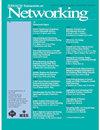通过精确带宽预测增强低延迟自适应直播流
IF 3.6
3区 计算机科学
Q2 COMPUTER SCIENCE, HARDWARE & ARCHITECTURE
引用次数: 0
摘要
为了保证HTTP自适应流(HAS)的高性能,提供端到端网络带宽的准确预测是至关重要的。低延迟直播(LLLS)越来越受欢迎,在这方面面临着更大的挑战。与视频点播(VOD)流媒体只需要长期带宽预测并可以容忍一些预测误差不同,LLLS需要精确的短期带宽预测。短期带宽经历了巨大的突然变化和不确定的波动,这一事实放大了这些挑战。此外,由于流量的开关模式,在LLLS中获得有效的带宽测量样本存在困难。在这项工作中,我们提出了DeeProphet,一个旨在通过实现准确的带宽预测来提高LLLS性能的系统。DeeProphet通过利用TCP状态信息识别数据包连续发送的间隔来收集有效的带宽样本,通过过滤噪声样本来稳健地估计段级带宽,并结合时间序列和基于学习的模型来预测未来带宽的显著变化和不确定波动。实验结果表明,与最先进的LLLS自适应比特率(ABR)算法相比,DeeProphet有效地将整体体验质量(QoE)提高了39.5%至464.6%。本文章由计算机程序翻译,如有差异,请以英文原文为准。
Enhancing Low Latency Adaptive Live Streaming Through Precise Bandwidth Prediction
To ensure high performance for HTTP adaptive streaming (HAS), it is critical to provide accurate prediction of end-to-end network bandwidth. Low Latency Live Streaming (LLLS), which has been gaining popularity, faces even greater challenges in this regard. Unlike Video-on-Demand (VOD) streaming, which only needs long-term bandwidth prediction and can tolerate some prediction errors, LLLS demands precise short-term bandwidth predictions. These challenges are amplified by the fact that short-term bandwidth experiences both large abrupt changes and uncertain fluctuations. Furthermore, obtaining valid bandwidth measurement samples in LLLS poses difficulties due to the on-off traffic pattern. In this work, we present DeeProphet, a system designed to enhance the performance of LLLS by achieving accurate bandwidth prediction. DeeProphet collects valid bandwidth samples by identifying intervals of packet continuous sending leveraging TCP state information, estimates the segment-level bandwidth robustly by filtering out noisy samples, and predicts both significant changes and uncertain fluctuations in future bandwidth by combining both time series and learning-based models. Experimental results demonstrate that DeeProphet effectively enhances the overall Quality of Experience (QoE) by 39.5% to 464.6% compared to state-of-the-art LLLS Adaptive Bitrate (ABR) algorithms.
求助全文
通过发布文献求助,成功后即可免费获取论文全文。
去求助
来源期刊

IEEE/ACM Transactions on Networking
工程技术-电信学
CiteScore
8.20
自引率
5.40%
发文量
246
审稿时长
4-8 weeks
期刊介绍:
The IEEE/ACM Transactions on Networking’s high-level objective is to publish high-quality, original research results derived from theoretical or experimental exploration of the area of communication/computer networking, covering all sorts of information transport networks over all sorts of physical layer technologies, both wireline (all kinds of guided media: e.g., copper, optical) and wireless (e.g., radio-frequency, acoustic (e.g., underwater), infra-red), or hybrids of these. The journal welcomes applied contributions reporting on novel experiences and experiments with actual systems.
 求助内容:
求助内容: 应助结果提醒方式:
应助结果提醒方式:


